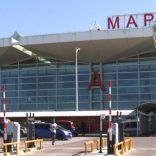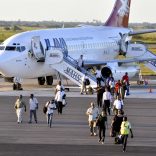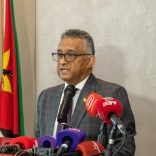Aman’s arrival in Karingani and Pomene is set to transform high-end tourism across Mozambique
Mozambique: Inhambane Tourism in steep decline

File photo / A view of Tofo beach in Inhambane province
There has been a sharp decline in tourism in the southern Mozambican province of Inhambane, and the situation threatens to deteriorate still further with the proposal to close Vilankulo airport to international traffic, reports Friday’s issue of the independent daily “O Pais”.
Tourism was considered a mainstay of the Inhambane economy, thanks to vast expanses of unspoiled beaches, and the pristine waters and marine fauna of the Bazaruto National Park. But the economic crisis engulfing Mozambique is pushing tourist establishments out of business.
And even though most of Inhambane is untouched by the insurrection waged by the Renamo rebels, the military tensions contribute to keeping foreign tourists away.
According to data from the Inhambane Provincial Tourism Association, 15 tourism establishments closed in the first half of this year, making about 100 workers unemployed.
“O Pais” visited one hotel on a Sunday lunchtime, and found just one tourist there. The hotel manager, Manjuel Dzenga, said Sundays used to be busy, with Mozambican families lunching at the hotel restaurant. But now it is deserted – when money is short, eating out is one of the first luxuries to be cut.
Dzenga said that, with the sharp rises in the prices and services his business needs, he will have no option but to lay off some of the hotel’s 40 workers.
Up until 2014, Inhambane tourism was recording an average annual investment in tourism of about 40 million US dollars, but in 2015 the figure fell to 10 million dollars, and this year, instead of investment, the sector is shrinking.
Tourism operators fear that a fatal blow to the business could be given by the incomprehensible decision to close the airports in Inhambane city and in Vilankulo to international traffic.
It is through Vilankulo airport that many foreign tourists reach the Bazaruto archipelago, and the beach resorts in Vilankulo and Inhassoro districts. The importance of this airport used to be recognized by the government which invested about 10 million dollars in modernizing the airport, tripling its capacity so that it can now handle more than 200,000 passengers a year. Currently an average of two international flights a day land at Vilankulo.
If, for example, direct flights between Johannesburg and Vilankulo cease to exist, foreign tourists will either have to change planes in Maputo, or travel by road. The Inhambane Tourism Association fears that they will not do so, and that tourist arrivals in Vilankulo, Inhassoro and Bazaruto will slump.
This would be disastrous for thousands of people in these parts of the province who depend on tourism for a living. The tourism operators are now lobbying the government to reverse the decision to close the airport.
The publicly owned airports company, ADM, last year floated the idea of restricting the number of international airports to just three – Maputo in the south, Beira in the centre, and Nacala in the north – in flagrant contradiction of the government’s declared commitment to expanding tourism.
Inhambane hotels have a total of 8,134 rooms and 16,231 beds, which is 37.5 per cent of the national accommodation capacity. Tourism directly employs 7,346 people in the province, which is 35.3 per cent of all formal sector employment in Inhambane.













Leave a Reply
Be the First to Comment!
You must be logged in to post a comment.
You must be logged in to post a comment.